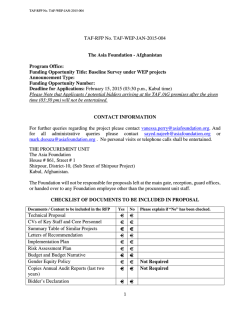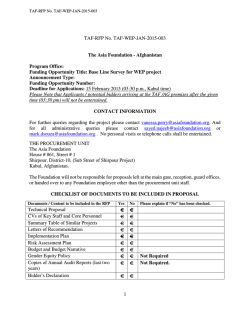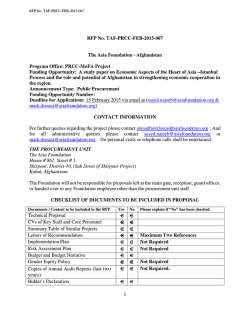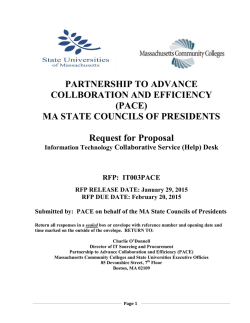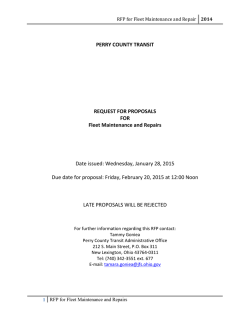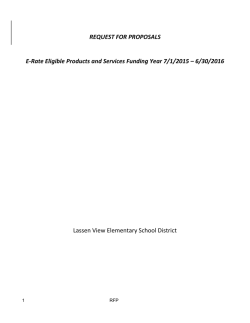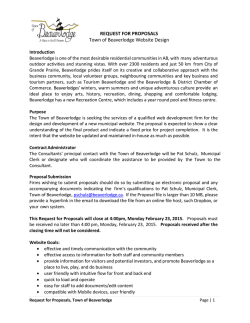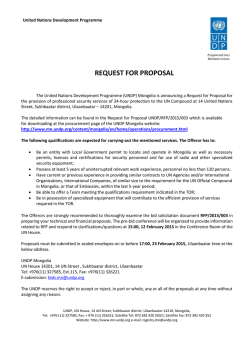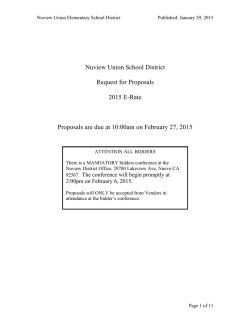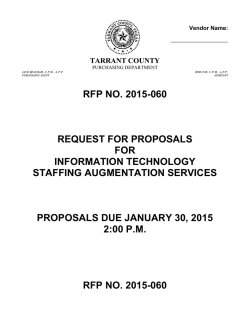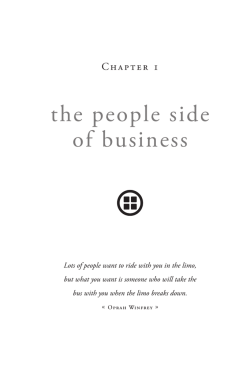
Ten Ways to Write a Losing Proposal
Government & Commercial Proposals Proposal Best practices Proposal industry news Proposal tips, tricks, & secrets EXECUTIVE summary Fall 2012 | Volume 19, Issue 4 This Issue’s Theme: Developing A Winning Solution For Your Proposal Inside: 1 What Do Aerobatics Have To Do With Business Development Organizations? 5 What Are InfoGraphics And Should I Use Them In My Proposals? 9 What Are My Winning Proposal Secrets? I’ll Never Tell! 12 Developing A Winning Image For Your Proposal 14 Winning Solutions Begin With A Winning Proposal Team 17 Ten Ways To Write A Losing Proposal 19 September Dinner Series Event Focused On Proposal Processes That Fuel Growth 20 APMP-NCA and APMP International Upcoming Events 22 APMP-NCA 2012 Corporate Partners A Publication of the Association of Proposal Management Professionals (APMP) National Capital Area (NCA) Chapter Legal Corner Ten Ways To Write A Losing Proposal by Shlomo D. Katz I n this issue, you will read many excellent articles about writing winning proposals. This article will summarize some common mistakes offerors make. If you want to increase your chances of writing a losing proposal, these are mistakes that you can imitate. 3. Don’t follow the RFP instructions. The RFP instructions help make the competition fair. If they say your proposal should be 20 pages long, make yours 21 pages long and put some important information on the last page, where the Government will be forced to ignore it. 1. Don’t read the RFP. The RFP, including all of its attachments and cross-referenced documents, is where you’ll find the information you need to write a proposal that might win. To increase your chance of losing, skip some parts of the RFP on the assumption that they are not important anyway. 4. Don’t address the evaluation criteria in your proposal. 2. Give the Government what you know it needs, not what the RFP asks for. This tip and the next two are related. Bid protest decisions from the Government Accountability Office (GAO) make it clear that offers must be judged against the RFP, not against some unstated criteria or secret statement of work. For example, if the RFP says the Government wants a yellow widget, it cannot award a contract for a red widget without amending the RFP and giving everyone a chance to bid on that. So, if you know that the user really wants a red widget, not the yellow one called for by the RFP, offer the red one in order to increase your chances of losing. Even if you are awarded the contract, the GAO will likely take it away after a protest. Fall 2012 Agencies are required to disclose the major evaluation criteria and then follow them. This is also about fairness. If you want to make the evaluators’ jobs harder and increase your chances of losing, don’t clearly describe why your product or service should receive the highest evaluation ratings. Bury relevant information in your proposal or just omit it. 5. Assume the Government’s proposal evaluators know your capabilities. Incumbents are especially good at this one. Why waste valuable proposal space providing the information that the RFP requires when the customer already knows you? That’s only for winners, who understand that the award decision is required to be based on what you wrote in your proposal, not on what the evaluator knows independently. (See my article, How Proposal Evaluation Is and Is Not Like Grading a College Essay, in the Winter 2010/2011 Executive Summary issue.) 6. Don’t justify your cost proposal. Propose a price that’s too good to be true, and don’t explain why it’s actually realistic. 7. Don’t prove that your technical proposal is realistic and achievable. Propose a schedule that’s too good to be true or make incredible promises about the speed or reliability of your product, and don’t demonstrate that those claims are realistic and verifiable. 8. Fail to recognize and mitigate organizational conflicts of interest. | Association of Proposal Management Professionals—National Capital Area 17 Ten Ways To Write A Losing Proposal Contracting Officers are not allowed to exclude offerors just because they might have an OCI, but they are permitted—indeed, required—to find out how offerors and contractors will mitigate potential conflicts. If you don’t want to win, don’t take this seriously. For example, don’t think about whether your company has an unfair competitive advantage because it has access to non-public information under another contract, and don’t think about common mitigation strategies such as so-called firewalls. And, whatever you do, don’t disclose the potential OCI and/or your mitigation plan in your proposal. 9. A ssume that you will be able to submit a BAFO/ Final Proposal Revision. Only people who want to win offer proposals the first time around that the Government could potentially accept. Losers take it for granted that they will have the chance to make changes and sharpen their pencils, something that may or may not happen in reality. him leave it at the first floor reception desk instead. That will help you lose. Of course, you might not want to write a losing proposal. Perhaps you’d rather win. In that case, you can increase your chances by doing the opposite of what I’ve suggested above. Thank you to my colleagues Ken Weckstein and Tammy Hopkins for some of these tips. 10. Submit your proposal late. If all else fails, get your proposal in a few minutes after the deadline stated in the RFP. That way, the Government won’t even consider it. One way to do this is by not meticulously following the instructions in the RFP for how you should deliver your proposal. For example, if the RFP says that your courier should take the proposal to the second floor mailroom, have Shlomo D. Katz is Counsel in the Washington, DC office of the international law firm of Brown Rudnick LLP, a Corporate Sponsor of APMP-NCA. Shlomo specializes in all aspects of Government contracting and is a regular presenter at chapter events. If you have any questions about the topic of this article or other proposal or contracting issues, please contact Shlomo at 202.536-1753 or [email protected] passionate Brown Rudnick lawyers passionately committed to our clients our practices our communities commitment BROWN RUDNICK’S Government Contracts team has a formidable record of success in helping clients resolve a wide range of complex business disputes. We are a top-ranking Washington group with more than 25 years experience representing world-leading companies in the defense, technology, energy, nuclear and construction industries, health care, real estate, as well as small, mid-sized and emerging companies and public entities. From advising on the legal aspects of proposal preparation to prosecuting and defending bid protests before the Government Accountability Office (GAO), to asserting and defending claims before courts and boards of contract appeals, to investigating and defending civil and criminal fraud accusations, our team delivers proven abilities and a grounded perspective. BOSTON DUBLIN HARTFORD LONDON NEW YORK PROVIDENCE WASHINGTON Shlomo D. Katz, Esq.+1.202.536.1753[email protected] S 2012 | Association of Proposal Management Professionals—National Capital Area Summer © 2012 BROWN RUDNICK LLP AN INTERNATIONAL LAW FIRM 24 X X X C S P X O S V E O J D L D P N
© Copyright 2026
